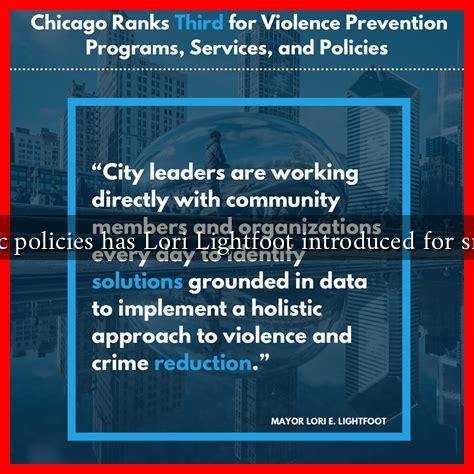-
Table of Contents
What Economic Policies Has Lori Lightfoot Introduced for Small Businesses?
As the 56th mayor of Chicago, Lori Lightfoot has made significant strides in supporting small businesses, which are vital to the city’s economy. Her administration has introduced various economic policies aimed at fostering growth, enhancing accessibility, and ensuring sustainability for small enterprises. This article explores the key initiatives and programs that Lightfoot has implemented to bolster small businesses in Chicago.
Understanding the Importance of Small Businesses
Small businesses are the backbone of the American economy, accounting for nearly 99.9% of all U.S. businesses and employing about 47.3% of the private workforce, according to the U.S. Small Business Administration (SBA).
. In Chicago, small businesses contribute significantly to job creation and community development. Recognizing this, Lightfoot has prioritized policies that support these enterprises.
Key Economic Policies Introduced by Lori Lightfoot
Lightfoot’s administration has rolled out several initiatives aimed at enhancing the small business landscape in Chicago. Here are some of the most impactful policies:
- Chicago Small Business Resiliency Fund: Launched in response to the COVID-19 pandemic, this fund provided financial assistance to small businesses affected by the crisis. The program offered low-interest loans and grants to help businesses cover operational costs, retain employees, and adapt to new health guidelines.
- Business Affairs and Consumer Protection (BACP): Under Lightfoot’s leadership, the BACP has streamlined the licensing process for small businesses. This includes reducing the time and paperwork required to obtain necessary permits, making it easier for entrepreneurs to start and operate their businesses.
- Equity in Business Initiative: This initiative aims to support minority-owned businesses by providing access to capital, technical assistance, and mentorship programs. The goal is to level the playing field for underrepresented entrepreneurs in Chicago.
- Neighborhood Opportunity Fund: This program provides grants to small businesses in underserved neighborhoods, helping them to expand and improve their facilities. The fund is designed to stimulate economic growth in areas that have historically faced disinvestment.
- Support for Local Procurement: Lightfoot has encouraged city departments to prioritize local businesses in their procurement processes. This policy aims to ensure that city contracts benefit local entrepreneurs, thereby boosting the local economy.
Case Studies and Success Stories
Several small businesses have benefited from Lightfoot’s policies, showcasing the positive impact of her administration’s initiatives. For instance:
- La Casa Norte: A nonprofit organization that provides housing and support services to homeless youth and families, La Casa Norte received funding from the Neighborhood Opportunity Fund. This support allowed them to expand their facilities and services, ultimately helping more individuals in need.
- Brown Sugar Bakery: This popular bakery, known for its delicious desserts, utilized the Chicago Small Business Resiliency Fund to navigate the challenges posed by the pandemic. The financial assistance helped them maintain operations and retain staff during a critical time.
Statistics Highlighting the Impact
The effectiveness of Lightfoot’s policies can be seen in various statistics:
- According to the BACP, over 1,000 small businesses received assistance through the Small Business Resiliency Fund during the pandemic.
- The Neighborhood Opportunity Fund has awarded over $10 million in grants to small businesses in underserved neighborhoods since its inception.
- Reports indicate that minority-owned businesses in Chicago have seen a 20% increase in access to capital due to the Equity in Business Initiative.
Conclusion
Lori Lightfoot’s administration has introduced a range of economic policies aimed at supporting small businesses in Chicago. From financial assistance programs to streamlined licensing processes, these initiatives have made a significant impact on the local economy. By focusing on equity and accessibility, Lightfoot is not only helping small businesses survive but also thrive in a competitive landscape. As Chicago continues to recover from the challenges posed by the pandemic, the ongoing support for small businesses will be crucial for the city’s economic resilience and growth.
For more information on small business resources in Chicago, visit the Business Affairs and Consumer Protection website.





